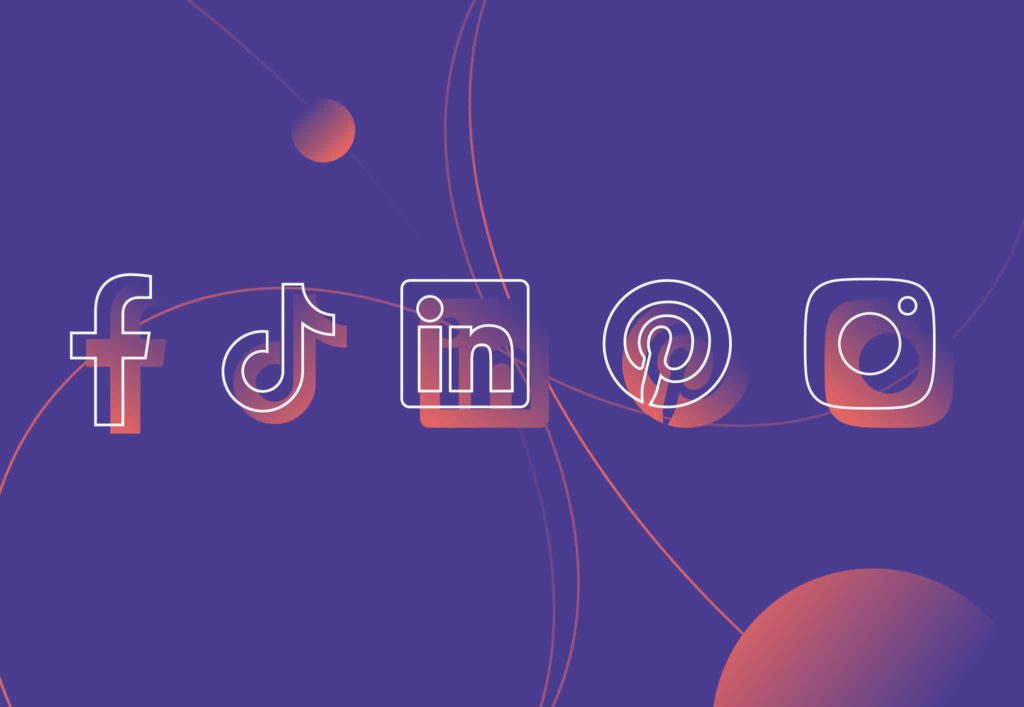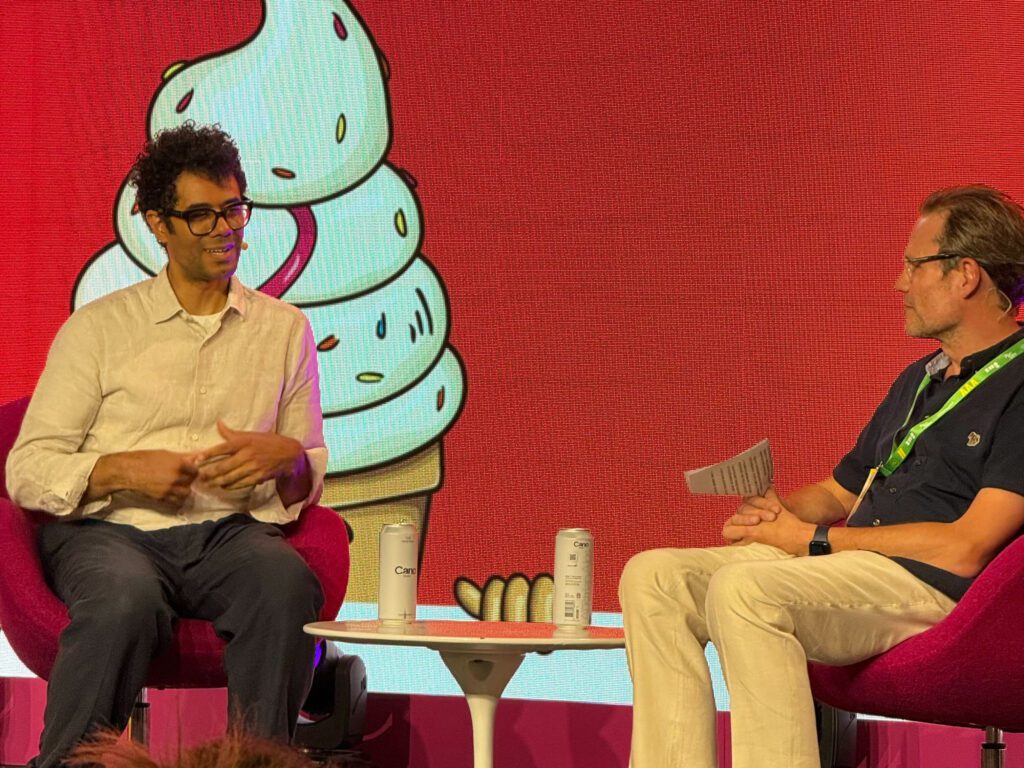
The 18 Most Thought-Provoking TED Talks about Social Media

From its mental health effects to how huge tech companies work to earn our attention, these are 18 of the best TED Talks about social media that we’ve found on YouTube.
TED Talks in general are fascinating insights into all sorts of worlds, industries, and sectors and these from professors and experts who’ve emanated from the social media world are certainly worth your time.
The beauty of TED Talks is that they are almost always under 20 minutes meaning you can watch a good few of them on your lunch break or your commute home!
At Embryo, our paid social teams take time to understand their industry to ensure they’re providing the best possible service to our wide range of clients.
To learn more about how we can help, reach out to our team by phone on 0161 327 2635 or email info@embryo.com.
18 Of The Best Social Media Ted Talks
‘The Dark and the Light of Social Media’ – Farzana Qasimi
If you’re after a talk that looks at the broader themes – both good and bad – of social media, then Farzana Qasimi’s TEDxCasey talk is for you.
A key focus of this talk is the privacy concerns that arise from using social media, a topic that is felt keenly by everyday users and tech commentators.
Qasimi has an engaging and extremely watchable presentation style making her points about these platforms even more powerful.
In her talk, she aims to empower you to shed the need to impress your audience and find value from within while signalling the way in which platforms have a significant impact on the lives of their users.
The dark and light of social media | Farzana Qasimi | TEDxCasey
‘Quit Social Media’ – Dr Cal Newport
Known for advocating for ‘deep work’ and helping people stand out amongst the rest in the workplace, Dr Cal Newport is a very interesting voice and someone worth listening to when it comes to social media.
In this TED Talk, it’s fair to say that he’s not a huge fan of social media. I mean, the title alone suggests that. In a nutshell, Dr Newport advocates that users delete social media altogether and uses his own experience of leaving various platforms as a case study of how beneficial it can be.
One might argue that Dr Newport is being overly pessimistic about social media and that a more balanced approach would be more accurate. However, after all, all TED Talks are just someone expressing their opinion so take it how you want to! Either way, it’s worth a few minutes of your time.
Quit social media | Dr. Cal Newport | TEDxTysons
‘Live In the Moment: Delete Social Media’ – Ryan Thomas
Social media is deeply ingrained in our lives and it can be hard to take a step back to see how much we use/rely on it. Further, it can be so consuming that we can often forget to take a moment to appreciate a moment in time without feeling the need to post about it.
Ryan Thomas, in his talk, attempts to convince us to do just that – live in the moment!
His specific argument is about the lack of presence people, who are ingrained in social media, can have during their lives. Thomas isn’t completely against social media (despite the title), for instance, he recognises how social media marketing can be hugely beneficial for businesses. Overall, Thomas does look to encourage viewers to de-integrate themselves from social media to reclaim their identity.
Live in the Moment: Delete Social Media | Ryan Thomas | TEDxAshburnSalon
‘How To Seek Truth In the Era of Fake News’ – Christiane Amanpour
Social media is the vehicle through which fake news grows and spreads. And, in this TED Talk conversation between Christiane Amanpour and Chris Anderson, they talk about how fake news, and its spread, is one of the greatest threats to democracy.
It might not be the most optimistic discussion but Amanpour is a journalist of real clout and is someone that people should sit up and listen to.
She talks about how it’s impossible to solve the big issues of our time when social media platforms have allowed both real and fake news to co-exist. If we’re not all basing our argument on one set of facts, the solutions to our problems will take longer to find.
How to seek truth in the era of fake news | Christiane Amanpour
‘What Makes Something Go Viral?’ – Dao Nguyen
Anyone that runs a social media account, be it one of their own or a business account, wishes that their content would go viral.
The science behind what makes something go viral is a mythical one, no one really knows what ingredients are needed for something to go properly viral.
Sometimes, as exemplified in Dao Nguyen’s talk, something can go viral accidentally.
She talks about how virality usually happens when we are all thinking of the same thing at the same time, as opposed to all reacting to something – a cute animal or funny video, for example.
Her example that proved this is a BuzzFeed live video that went wrong. As things were going wrong, BuzzFeed read the 82,000 comments and found that virality came from all the users thinking and feeling the same thing, and feeling like they were in a community.
What makes something go viral? | Dao Nguyen
‘What I Learned From My Social Media Fast’ – Amber Quinney
Williams-Franklin Foundation awardee Amber Quinney makes a more positive case for social media usage, particularly amongst young people, the section of society who use social media the most.
Rather than advocating for a total removal of social media from people’s lives, Quinney stresses the many benefits of social media and insists it can be used for good.
Instead, Quinney argues young people shouldn’t use platforms such as Instagram or TikTok for self-validation, which, she argues, should come from within.
By removing yourself from social media now and again, Quinney says that people can have a more positive memory/relationship with their favourite social media platforms.
What I learned from my social media fast | Amber Quinney | TEDxYouth@Buffalo
‘The Curly Fry Conundrum: Why Social Media “Likes” Say More Than You Think’ – Jennifer Golbeck
Focusing on Facebook, and curly fries, Jennifer Golbeck’s TED Talk goes deep into how apps and tech companies use your activity on their platforms.
She argues that information control should be returned to users, the ‘rightful’ owners and that the technology behind platforms and algorithms isn’t as benign as we think.
Watch the video below to learn how social media likes and curly fries are related.
Jennifer Golbeck: The curly fry conundrum: Why social media “likes” say more than you might think
Kristin Gallucci believes that social media is in fact doing the opposite, and making us less social, or ‘unsocial’, as she puts it.
In a passionate TED Talk, Gallucci focuses on specific negatives regarding social media, notably the rise of laziness, what some might call performative, activism.
Gallucci isn’t blind to the benefits of being online, the opposite in fact. Here the argument is that it’s used in the wrong way and rather than being used as an alternative for real-life social engagement it should be used as the springboard for real-life interactions.
Much like Amber Quinney’s piece, Gallucci urges viewers to adopt a healthier, more balanced relationship with social media.
Social Media is Making Us Unsocial | Kristin Gallucci | TEDxBocaRaton
Another great TED Talk argues that social media has actually made us less social people.
As a social media historian, Allison Graham really knows her stuff and it shows in this very watchable presentation. Not only does she talk about the more philosophical elements of social media’s a-socialisation of people, but she also uses stark facts and figures to drive home her point.
In what is becoming a theme with these talks, Graham urges viewers to ‘explore’ the world outside their phones and ‘hold hands’ rather than ‘click’ keys.
How social media makes us unsocial | Allison Graham | TEDxSMU
‘How Craving Attention Makes You Less Creative’ – Joseph Gordon-Levitt
Known for 500 Days of Summer and 50/50, actor Joseph Gordon-Levitt turned his hand to TED Talks and delivered a powerful message about how craving attention ultimately leads to a person being less creative.
The rise of social media platforms has allowed us all to draw attention to ourselves and earn the adoration of the masses. This, initially, feels great, after all, who doesn’t love people telling you how great you are?
However, Gordon-Levitt posits that, in the long-term, earning attention stifles the creative spark that got you ‘famous’ in the first place.
This is because, instead of doing something for the love of it, you’re creating something that is there just to earn likes and reposts.
How craving attention makes you less creative | Joseph Gordon-Levitt
‘How Social Media Shapes Identity’ – Dr Ulrike Schultze
We all, at least, loosely understand how social media has become woven into our lives, but knowing how it’s shaped our identity? Well, that’s a whole different matter.
And it is one that Dr Ulrike Schultze attempts, successfully, to dissect in her talk.
The main theme in this in-depth talk is how our relationship with technology and social media has become symbiotic. We have created this technology and, over time, the technology has shaped us and ‘created’ our identities.
Dr Schultze urges viewers to think about how our online behaviour is affected or changed by the use of technology, something I think we can all agree with!
How Social Media Shapes Identity | Ulrike Schultze | TEDxSMU
‘Socially Silent: My Relationship With Social Media’ – Siena Wescott-Toi
Through her own experience, Brit Siena Wescott-Toi charts the brief history of social media, with a focus on how its main purpose has changed.
What was once a way to connect with like-minded people and communities, these platforms have now become places that have allowed negative social interactions, such as trolling and cyberbullying, to flourish.
She herself has undertaken a ‘fast’ of social media and is glowing in her praise about the effects it has had on her life.
Her youth and past experiences make her argument for creating a balanced relationship with social media a very compelling one.
Socially Silent: my relationship with social media | Siena Wescott-Toi | TEDxYouth@Haileybury
‘A Year Offline, What I Have Learned’ – Paul Miller
It wasn’t trolls, fake news, or an overwhelming sea of content that saw Paul Miller quit social media/his online life in general… it was emails!
From that, though, he discovered a sea of benefits, which he details in his TED Talk.
As well as no longer having to respond to endless emails, Miller found himself enjoying not having to traipse through endless content on Twitter, for instance, most of which was not adding any value to his life. Something done out of a sense of ‘well, everyone else is doing it’ rather than an exercise that bore fruit.
Miller isn’t all in on one side of the argument, though, he freely admits that social media hasn’t, or never was, going to fix his problems but the time away from it helped him discover balance and the ability to be more emotionally present.
A year offline, what I have learned | Paul Miller | TEDxEutropolis
‘How Amazon, Apple, Facebook and Google Manipulate Our Emotions’ – Scott Galloway
Ever heard of The Big Four? It’s the term used to umbrella Amazon, Apple, Facebook and Google, four of the biggest companies going, all of whom have an inordinate amount of control, influence, and say over our lives, whether we know it, or like it, or not.
For context, these four companies’ total capitalisation is the same as the GDP of India, a country of over one billion people.
To drive home this fact, Scott Galloway, marketing guru at NYU, delivers a TED Talk that is equal parts funny, equal parts informative.
Through spreadsheets, stats, and humour, Galloway rants about how these four companies have far, far too much dominance over our everyday lives.
Want to see what happens if we companies prize shareholders over everything else? Then Galloway’s TED Talk is for you.
How Amazon, Apple, Facebook and Google manipulate our emotions | Scott Galloway
‘How A Handful Of Tech Companies Control Billions Of Minds Every Single Day’ – Tristan Harris
The psychology behind social media is a fascinating, somewhat eye-opening, subject. Tristan Harris, a co-founder of a non-profit looking to drag humanity’s attention away from their screens and back to the ‘real world’, breaks down this topic in his talk.
He details how companies – such as Google, Apple, and Meta – work tirelessly to keep our attention on their platforms through various methods.
These include Netflix’s autoplay, Snapstreaks, and the way Reels are designed to encourage you to continue to scroll, and scroll, and scroll.
His overarching argument/philosophy is that we should all be leading a revolution where tech works in our ‘best interests’.
Whichever side of the argument you fall down, there is no denying that Harris is compelling.
How a handful of tech companies control billions of minds every day | Tristan Harris
‘Your Online Life, Permanent As A Tattoo’ – Juan Enriquez
Nowadays, people throw content on the internet without even thinking about it. From updating their Reels to posting TikToks to billions, we constantly advertise ourselves.
And while, at the time, we might not think about the long-term effects of social media, Juan Enriquez, emphasises the permanence that posting on social media can have, in his TED Talk.
These ‘digital tattoos’ as he calls them, are very real and aren’t being given the significance they deserve.
Juan Enriquez: Your online life, permanent as a tattoo
‘Is Social Media Hurting Your Mental Health?’ – Bailey Parnell
There’s no denying the link between social media and mental health. And, while there are positives, from being a part of a community to being able to express your passion, there is no skipping over the fact that social media can, and has had huge negative consequences on people.
In this TED Talk, Bailey Parnell argues the latter in a way that is powerful and thought-provoking. Yes, because of the content that she’s talking about but also because of her delivery and presentation.
Bailey doesn’t just signal the alarm bells though, she offers detailed insights and strategies for viewers on how to cope with the ‘dark side’ of social media.
All of the above makes this a very important watch for anyone in the world of social media.
Is Social Media Hurting Your Mental Health? | Bailey Parnell | TEDxRyersonU
‘What Obligations Do Social Media Platforms Have to the Greater Good?’ – Eli Parser
We’re living through tumultuous times, that’s obvious. And, as the world moves and changes at an ever-increasing pace, Eli Pariser posits that social media companies should be doing more for the greater good.
In an interesting 17-minute TED Talk, Pariser argues that we should be taking inspiration from social scientists and those who plan our communities when building our online spaces.
Taken over by trolls and misinformation, Pariser raises the interesting point that, much like real-life towns and cities, structure and authority is needed for everyone to thrive and have an enjoyable experience.
What obligation do social media platforms have to the greater good? | Eli Pariser
Are There Any TED Talks About Social Media That We’ve Not Included? Let Us Know!
We hope you enjoyed these TED Talk recommendations about social media, if you think there is one that we should include, but haven’t, then please feel free to let us know!
As you’ve seen, the social media landscape is full of subtopics, opinions, and issues. If you’re a business that wants to leverage the benefits of having a social media presence but are unsure about the methods needed to hit relevant KPIs then get in touch!
Our team are ready and waiting, simply call us on 0161 327 2635, email us at info@embryo.com, or hit the contact button below!


